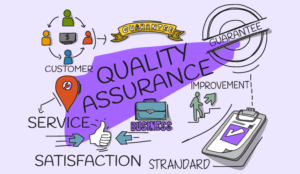AI is already having a significant impact on call centre QA, and its influence is likely to grow even further in the near future. In fact, a recent study forecasts that the call centre AI market will grow to $4.3 billion by 2027.
With advancements in technology, call centres are using AI and automation tools to improve customer experience. According to a recent report, CX is now the main reason for investment in AI technology, overtaking cost reduction.
Call centres are using artificial intelligence to power chatbots, interactive voice response, auto-routing, process automation, and much more.
However, while artificial intelligence brings many clear upsides for contact centre leaders, we must be mindful that there are also downsides to automating every aspect of contact centre quality assurance and becoming too reliant on AI.
Upsides of Using AI and Automation for Call Centre QA
As technology has advanced, the implementation of artificial intelligence in the call centre has grown. AI is now used for evaluations, reporting, analysis, customer service, and more.
It offers call centre leaders a powerful set of tools to increase efficiency, lower costs, and support agents to deliver the best possible customer experience. Let’s have a closer look at the main upsides to using AI in your call centre QA.
Operational Efficiency
Automation is a powerful part of AI. By automating call centre processes, you can improve efficiency, leading to reduced operating costs and greater resource availability.
According to Alvaria, a US Fortune 500 health insurer saw $17 million in annual savings following the introduction of automated processes.
Automation can make self-service channels more intuitive, reducing expenditure on hiring and training additional agents and saving call centres 30 percent on customer service costs.
Improved Time Management
By combining the power of AI, automation, and technology-based routing, you can achieve remarkable results.
For example, AI-powered predictive call routing can direct customers to the agents who are best equipped to handle their issue, allowing for personalized service and saving both agents and customers valuable time.
Automating repetitive tasks frees agents to spend more time on what really matters—delivering exceptional customer service.
With self-service options like chatbots handling basic queries, fewer human hours are required to manage the volume of incoming calls, enabling agents to handle more complex tasks which require greater concentration.
This doesn’t negatively impact CX, with a recent report finding that the majority of customers were satisfied with the answers they received from chatbots.
Enhanced Compliance
In the age of remote work, compliance has become even more challenging, with scattered workforces presenting additional problems for call centre leaders concerned with regulatory adherence.
Using AI, you can monitor agent–customer interactions to ensure that agents are adhering to company standards, scripts, and regulations, safeguarding your organization from any repercussions that may arise in the event of a breach.
Improved Training and Coaching
AI insights can be a powerful tool for agent training and coaching. With the help of technology and conversational analytics, every single agent–customer interaction becomes a learning tool. You can gain visibility into 100% of agent conversations rather than a select few.
This allows for a more comprehensive analysis, where you can identify trends and deliver targeted training.
If your feedback is based on every interaction, agents can be sure that it accurately represents their usual standards and are more likely to be open to it.
Better Analytics and Insights
AI analytics can provide excellent insights into the organization’s operations, not just the performance of an individual agent.
More importantly, AI can do so at a scale that would be impossible for a person, or even a team, to replicate.
This allows for in-depth analysis of interactions and actionable insights around revenue opportunities, customer experience, and more.
For example, AI could identify customers at risk of churning, assess their personality and sentiment towards the brand, and prompt managers to reach out with a personalized approach based on these AI-driven insights.
Enhanced Customer Experience
Customer experience is a top driver for investment in AI technology. With predictive routing and chatbots, insights into customer sentiment and behavior, and real-time assistance for agents, AI provides various tools that can be leveraged to consistently deliver superior CX.
These tools give agents a better understanding of customers and free them up to focus on more complex issues, while self-service options handle the simple queries.
With a 2022 report finding that “78% of customers would be willing to go out of their way to go to a company that has better customer service”, any opportunity to improve CX should be viewed as an opportunity to retain customers and increase long-term revenue.
More Accurate Evaluations and Performance Reviews
Using AI, the evaluation process is not only quicker, it’s also more accurate and provides real, actionable insights.
While manual evaluation remains at the heart of the process, it is often based on a limited number of interactions and carried out by a handful of people, increasing the chances of bias, AI can pull data from a wide range of sources, support evaluators in becoming more precise in their work, and pinpoint the areas they want to focus on for more detailed, accurate evaluations.
Reduced Stress for Both Agents and Evaluators
AI can minimize stress for both agents and evaluators, reducing the collective workload and streamlining the scoring process.
The insights from AI-driven evaluations are more accurate and easier to deliver, making agents more receptive to feedback and allowing evaluators to really get their message across.
With detailed scorecard insights highlighting areas for improvement based on a wider data range, agents will be better placed to improve their performance. And the delegation of simpler queries to self-service tools allows them to focus on more rewarding work.
The Potential Downsides of Using AI in QA
While AI can be extremely beneficial for call centres, it’s not without its problems. Diving into AI too quickly, becoming overly dependent on it, and placing too much trust in the technology can lead to problems and even set your call centre back.
It’s important to remember that AI is not a replacement for existing QA processes but another layer you can add to enhance these processes and support agents and evaluators.
Overreliance on AI Insights and Judgment
Even with all the benefits of AI and its ability to carry out instant, in-depth analysis, there will always be a need for human judgment throughout the QA process. Artificial intelligence is only as effective as the people behind it.
If you don’t implement it correctly, it might fall short of your expectations. For example, AI systems learn from datasets, and if these datasets are inaccurate or you fail to keep them up to date, the AI could throw up insights based on the wrong information.
Making decisions based on these insights could be costly for the call centre. If you leave everything up to AI, you’ll lose vital human insight.
Possibility of Mistakes
People aren’t perfect, and neither are machines. AI may help reduce the risk of human error but remains susceptible to errors of its own.
To avoid any issues, you must pay careful attention when setting up automation rules and continue to keep an eye on the technology over time.
AI certainly offers significant opportunities for automation, but it needs to be monitored to ensure it performs effectively on a long-term basis.
Relying Exclusively on AI Insights for Performance Reviews
Performance reviews drive big decisions concerning careers, with managers leaning on them when making calls on rewards, promotions, or even dismissals.
If you rely exclusively on AI insights when evaluating agent performance, you could miss the human factors that play into these reviews.
AI can be prone to viewing everything in black and white, but we know things aren’t so simple in reality. Perhaps an agent’s performance has dropped because of personal issues.
Overlooking this could result in a harsh performance review which, in turn, could lead to a dismissal. Human intervention in this scenario would look beyond the numbers.
Rushing AI Adoption Before Teams Are Ready
While the benefits of AI implementation can be significant, so is the preparation required for effective deployment.
Leaders need to discuss the importance of training and identify the scope of a transition period from entirely manual QA processes to AI-assisted.
If you get ahead of yourself, you could damage performance and set your organization back. Make sure everyone involved is fully prepared and understands the significance of this new approach before making the switch.
What Can You Do to Maximize the Benefits of Using AI and Minimize Risks?
The most important thing you can do to maximize the benefits of AI is to remember its purpose. It’s a tool to enhance call centre performance, not a replacement for your most valuable resource—your team members.
If you frame AI as a support rather than a threat, agents and evaluators will become more engaged and realize the benefits of the technology. You can do this by correctly approaching AI implementation, as outlined below.
Provide Comprehensive Training
Training is the foundation for the effective deployment of AI tools. This isn’t just for agents; this is for everyone involved, from managers and supervisors to evaluators and the IT team.
You undoubtedly already have existing technology supporting your call centre processes, so you will need to discuss how the new AI-driven tools will be integrated and what you can do to minimize disruption.
Identify Processes and Areas to Focus On
You should still assess which areas would benefit most from automation and focus on them as a priority. In fact, you may come to realize that certain areas wouldn’t really see much benefit from automation or may even be incapable of effective automation.
For example, new, complex customer issues are typically beyond the capabilities of existing AI. If a customer has an unforeseen issue that AI is not programmed to assist with, human intervention will be required.
In determining the priority areas, you should conduct analysis and request feedback from your team—they likely have insights into their departments that broader analysis won’t pick up.
Understand the Importance of Balance
AI and automation can complement your existing QA process, eliminating the need for agents to carry out mundane, repetitive tasks and strengthening your prior QA process, but they are not a replacement for your agents or evaluators.
There are certain elements that require human touch, input, and judgment. For example, with AI in place, fewer calls are likely to reach live agents, but the calls that come through are more complex.
They require the insight of an agent and likely concern problems outside the norm or more frustrated customers that need additional care.
Find a balance between old and new where human-driven work is made better with AI insights and automation.
Encourage Empathy and Sincerity
A recent Dixa survey found that 96% of respondents considered empathy an important part of a support interaction. It indicates to the customer that you are really listening and fully invested in finding a solution to their problem, that you can see things from their perspective.
The same applies to sincerity. Agents are able not only to deliver the right words but also the right tone. This helps ensure genuine and authentic customer experience.
Considering that a machine is incapable of offering either empathy or sincerity, remember to encourage those traits in your agents and reward them appropriately.
Keep Your Coaching Human-Centric
While AI can streamline and expedite the evaluation process and contribute valuable insights into the agent and team performance, you should not delegate the coaching entirely to AI.
A significant human touch is required to deliver the most effective training to agents. AI can be a guide, but you still need evaluators, supervisors, and managers to interpret the info provided by AI and take action based on their own judgment.
Only a real person can properly understand what it takes to deliver an engaging coaching experience. If an agent is receiving their training from a machine, they’re liable to switch off and lose enthusiasm for the role, limiting their growth and impacting performance levels.
Final Thoughts: Will AI Take Over Call Centre QA?
It’s clear that AI is here to stay, and some key benefits, like increased compliance, deeper insights, and enhanced CX, are undeniably useful. However, it will never—and should never—fully replace real agents and evaluators.
When it comes to quality assurance, it’s essential that humans have the last word. AI will continue to grow and hold greater influence in the industry, but it should be implemented as a support for agents, not a replacement.
This blog post has been re-published by kind permission of Scorebuddy – View the Original Article
For more information about Scorebuddy - visit the Scorebuddy Website
Call Centre Helper is not responsible for the content of these guest blog posts. The opinions expressed in this article are those of the author, and do not necessarily reflect those of Call Centre Helper.
Author: Scorebuddy
Published On: 3rd Apr 2023 - Last modified: 4th Apr 2023
Read more about - Guest Blogs, Scorebuddy






 Scorebuddy is quality assurance solution for scoring customer service calls, emails and web chat. It is a dedicated, stand-alone staff scoring system based in the cloud, requiring no integration.
Scorebuddy is quality assurance solution for scoring customer service calls, emails and web chat. It is a dedicated, stand-alone staff scoring system based in the cloud, requiring no integration. 









